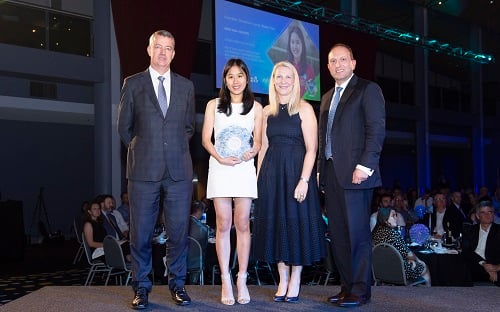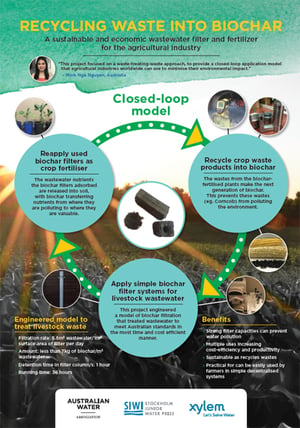Australian Stockholm Junior Water Prize past winners
Challenge yourself at the Australian Stockholm Junior Water Prize.
An annual water science competition for high school students.
2025 Winner
Matthew Young, Barker College

Matthew Young developed a solar-powered, robotic sub-surface aerator to help prevent algal blooms and improve water quality. His innovative system delivers oxygen to waterways using a venturi nozzle, operating autonomously and sustainably in diverse aquatic environments. Combining engineering creativity with environmental purpose, Matthew’s design is low-cost, scalable, and adaptable for use in both developed and remote communities. His work reflects a passion for building practical solutions that tackle real-world challenges with ingenuity, precision, and a clear vision for impact.
2024 Winner
Lily Rofail, PLC Sydney

Growing up in Sydney, Lily has always been interested in scientific, environmental, and social issues around water. At 16 years old, this young scientist is interested in solving global water problems and how she can make a difference.
Lily’s project "Hey-sop! Fix-up! and Avo-clean Water System" investigates the use of water hyssop (Bacopa monnieri) and avocado skin powder as natural solutions to reduce heavy metal contamination in aquatic environments. The research focuses on the bioremediation potential of these materials, specifically their ability to mitigate copper toxicity, a common pollutant in Australian water bodies. Duckweed was used to assess the effectiveness of these treatments in removing copper from water. This approach highlights an eco-friendly and cost-effective method for tackling water contamination issues.
Read the full article on Water Source here.
2023 Winner
Mikayla Rodger, Meriden School

Mikayla's project involves research into the causes of toxic cyanobacteria blooms and the development of a system which mitigates the risk. Cyanobacteria blooms plague global waterways and seriously impact the health of aquatic organisms, terrestrial animals, and humans. This threat is growing in prevalence alongside climate change and thus she aimed to design a system which prevents uncontrolled cyanobacteria reproduction (a bloom event), whilst allowing natural populations to exist. The design, the SolarCyanoSlayer, is also aimed to be self-sustaining for long-term implementation and constructed of biologically derived and recycled materials, reducing the embodied energy of construction. When placed in simulated eutrophic conditions the invention was demonstrated to be highly effective in countering cyanobacteria blooms and subsequently improving overall water quality.
Read the full article on Water Source here
2022 Winner
Julia Cummins, PLC Sydney

Read the full article on Water Source here.
2021 Winner
Annabelle Strachan, Meriden School

Read the full article on Water Source here.
2020 Winner
2020 Winner - Emma Serisier, Bishop Druitt College

Read the full article on Water Source here.
2019 Winner
Macinley Butson, The Illawarra Grammar School, New South Wales

The SODIS Sticker: Development and testing of a Film based detector system for appropriate Ultraviolet Solar Disinfection (SODIS) of Water
Macinley has developed the SODIS sticker, an innovative ultraviolet radiation sticker which accurately measures the solar UV exposure required to sanitise drinking water. This is done through a high accuracy transparent UV-sensitive film coupled with a partially UV blocking filter, which allows the SODIS sticker to measure direct UV exposure from the sun and reflected UV from other objects. At just over one cent to produce, it is also a cost-effective and safe way of purifying drinking water for developing communities
Following Macinley winning the Australian Stockholm Junior Water Prize in May 2019, she went on to take home the International Stockholm Junior Water Prize in August 2019. The Prize was presented to Macinley by HRH Crown Princess Victoria of Sweden.
Read more here about Macinley's win in Stockholm
View our 2019 Finalist Video Pitches
2018 Winner
Minh Nga Nguyen, Sydney Girls High School, New South Wales

Recycling Waste into Biochar: A Sustainable Wastewater Filter and Fertiliser for the Agricultural Industry
Minh Nga Nguyen, Sydney Girls High School (NSW)
Nga’s project is entitled “Recycling Waste into Biochar”, a sustainable waste water filter and fertilizer for the agricultural industry. Her project formed a model of application in which agricultural plant wastes are recycled into a multipurpose biochar charcoal, that can filter wastewater and fertilise plants. Nga found that bamboo biochar filter packs could remove 45.6% of harmful pollutants in wastewater, lowering pollutant content to meeting Australian guidelines. Her findings have the potential for application in the agricultural industry, allowing farmers to recover polluting plant wastes and turn it into biochar used to treat livestock wastewater, as well as aid crop growth.
View Nga's poster
2017 Winner
Macinley Butson, The Illawarra Grammar School, New South Wales
Macinley’s project involved the design and testing of a simple and affordable mechanical device to help solve the problems of clean water and power for people in developing communities. The Solar System, which produces solar energy, provides a supply of clean potable water for personal use as well as a sterile water supply for medical use. Macinley’s invention has the potential to help many people around the world as it can increase green energy power generation by over 70% per day and supply clean water daily.
Read more about Macinley's wining project
The Australian Stockholm Junior Water Prize was awarded at Ozwater’17 in Sydney. Watch the video below and hear what Macinley said about winning the award:
In our second video Macinley shares with us her Australian Stockholm Junior Water Prize experience:
2016 Winner
Mohamed Jakaria, Queensland Academies Health Science Campus, Southport, Queensland
Mohamed’s investigation examined the efficiency of Elodea canadensis in removing nitrate in effluent discharged from wastewater treatment plants. This was explored by answering the research question: What is the effect of increasing surface area of Elodea canadensis on the assimilation of nitrate in effluent discharged from Beenleigh wastewater treatment plant? This autotrophic aquatic plant’s ability to use inorganic nitrogen for growth provides an ecologically friendly solution to the tertiary treatment of wastewater.
The Australian Stockholm Junior Water Prize was awarded at Ozwater’16 in Melbourne. Watch the video below and hear what Mohamed said at the awards ceremony:
2015 Winner
William Tsai, Queensland Academy for Health Sciences
The effect of nitrate levels on the growth of Anabaena Circinalis
2014 Winner
Lewis Nitschinsk
An investigation into the optimal reclamation point of phosphate from an industrial wastewater treatment facility through chemical precipitation using Calcium Chloride.
2013 Winner
Declan Fahey, Hellyer College
Facing the Reality of Groundwater Salinity.
2012 Winner
I-Ji Jung, Queensland Academy for Health Sciences
Polymer Power: The extraction of divalent heavy metal ions from aqueous solutions using sodium polyacrylate and its potential use to treat heavy metal contaminated waterways in Queensland, Australia.
2011 Winner
Muthuja Bavanendrakumar, Queensland Academy for Health Sciences
Eutrophication of Waterways from Golf Corse Runoff
2010 Winner
Stephanie Reed, Mudgee High School
Artificial Wetlands: Recycling Household Grey Water.
2009 Winner
Storm Holwill, Marist Regional College
In the Name of Freshwater – An investigation into the capacity of marine environments to cultivate the microalgae Dunaliella tertiolecta to sequester atmospheric and industrial carbon dioxide and produce plant bio-mass for bio-fuel production without the use of fresh water.
2008 Winner
Dayffyd and Gwylim Klippel-Cooper , Glenunga International High School
Water Filtration utilizing Sea Shells.
2007 Winner
Robbie Bishop-Taylor, Great Lakes College
The Identification of Critical Salinity Thresholds for Upper Estuarine Plants
2006 Winner
Linda Van and Alex De Sousa, St James College
The Sustainability of the Brisbane River for Recreation and Commercial Use
2005 Winner
Andrew Stewart, Karabar Distance Education Centre
Multi-tiered Wetlands – A New Technique for Improving the Efficiency of Artificial Wetlands
2004 Winner
Nilmini Wijemunige, Somerville House
Water Treatment with Free-floating Aquatic Plants
2003 Winner
Andrew McLeod, North Sydney Boys High School
Improving Water Quality with Terrestrial Plants
2002 Winner
Andrew Shaw and Nathan Sawyer, Newton Moore College
Breeding and Releasing the Native Western Pygmy Perch
2001 Winner
Neil Robinson and Stuart Fearon, Newton Moore College
Habitat restoration and its impact on frog populations
2000 Winner
Jonathon Duniam, Marist Regional College
Habitat Assessment for the Burnie Burrowing Crayfish (Engaeus yabbimunna) on Shorewell Creek, Burnie, Tasmania




